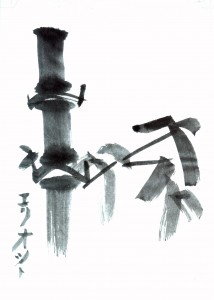![]() WriteSpa – An Oasis for Writers
WriteSpa – An Oasis for Writers
One of my grandmother’s – and my mother’s – favorite tenets in life was this: “Don’t let your possessions possess you.”
Traveling as they both did, during tumultuous times, when you could count on very little, and yet both of them owning some of the loveliest items in the world (an antique Renaissance dining table, exquisite Victorian glassware from my grandmother’s grandmother, rare Florentine leather-bound books, signed paintings from aspiring and famous artists), it must have been hard to know what was important to keep and what was important to let go.
When my mother was ten years old, she and her family were living in a tiny fishing village in Caldes d’Estrach in Spain. When civil war erupted in the late 1930’s, they were ‘rescued’ by a British destroyer that moved into the bay to evacuate them, since they were the only Americans residing in that area. My mother and her brother and sister were told they could only bring three things with them: a bathing suit, a sweater, and evening dress.
My father brought his extensive library with him wherever we traveled. What other possessions possessed our family? Silks from India, amethysts from Persia, herbs from Catalonia … these all seemed of vital importance to my mother. Also the wooden plates we’d had since the time we lived in Greece and the copper mug my brother made in school… even trying to live as simply as my parents did, some things made the crucial ‘to keep’ list.
But most possessions were constantly left behind, with neighbors, friends, or at a vendor in a flea market in Rome, or at a local charity shop in an English village.
Freedom from too many ‘things’ made the great adventure of travel, which seemed at the heart of my parents’ life together, much more pleasurable.
Writing Practice: The last ten things.
Imagine this: you are alone on a desert island-like-place, and you can only have ten items for the rest of your life. You have no electricity or form of energy outside what you can create yourself (in other words, no laptop or cell phone). Which ten items would you want to surround yourself with?
Most of the time, these are mine:
- pencil
- paper
- guitar (with extra guitar strings)
- 12 yards of colorful silk (to dance with, clothe myself, keep warm in, use as shelter)
- a deck of Tarot cards
- a book (the title always changes)
- a bed
- a pillow
- a cup
- a pocket knife
What are yours? Write them down. Then go to the next part of this writing exercise:
Remove five of these most vital possessions in your life. What are you left with?
Now remove two more. Reiterate the situation in your imagination: you’re left on a desert island, entirely alone, with only three items for the rest of your life. What are they?
Now remove another.
And another.
So now you discover the one item that you feel you would like to have with you, when all else is gone. For me, the first time I did this, the outcome was a surprise.
I do this exercise for myself every few years or so, and find the first ten items are remarkably stable.
I do it for my main character every time I write a novel, and find it gives me enormous insight into the essence of their being.
- Fresh mangoes falling into the hammock
- Red roofs of Rome
- Diving into the pool
- The greatest kindness
- Smooth sailing
- Brilliant sparkles on the waves
- Knowing the way

This post is really beautiful and thought-provoking and filled with wisdom.
I’m so glad your comment on my blog lead me here!
And, you are right — it is all about the conversation — and conversation is always a two way street.
that — and I don’t like being rude!
Thanks!
Well, I have been thinking about this same issue a lot myself – because all this talking together eats up so much time. But one thing I’m realizing is – what is time for, except for wonderful encounters like ours!? I’ve met people who have changed my life – simply through ‘comment.’ Thank you for responding, dear Louise and everyone should visit your site too: http://www.recoveryourjoy.blogspot.com